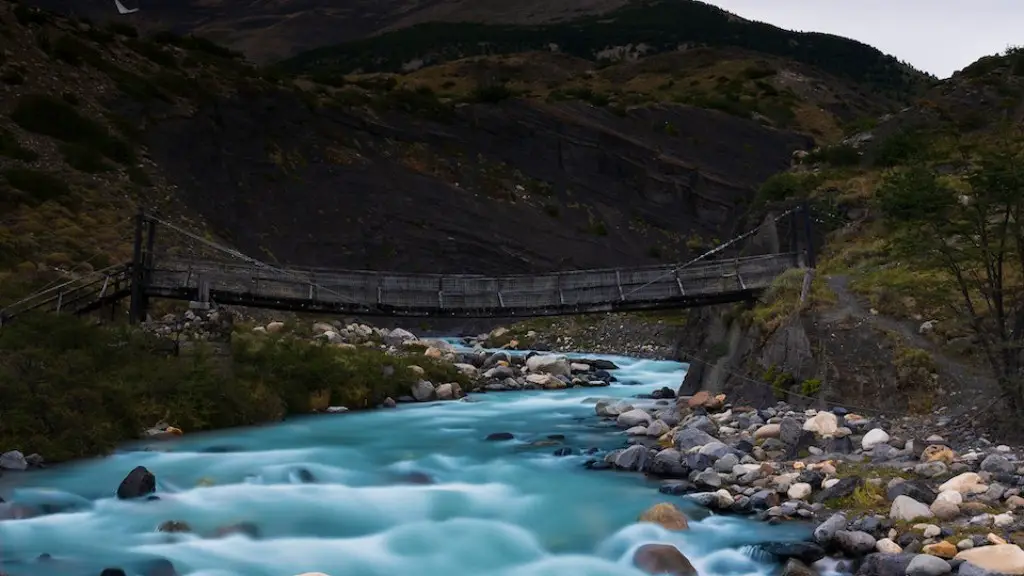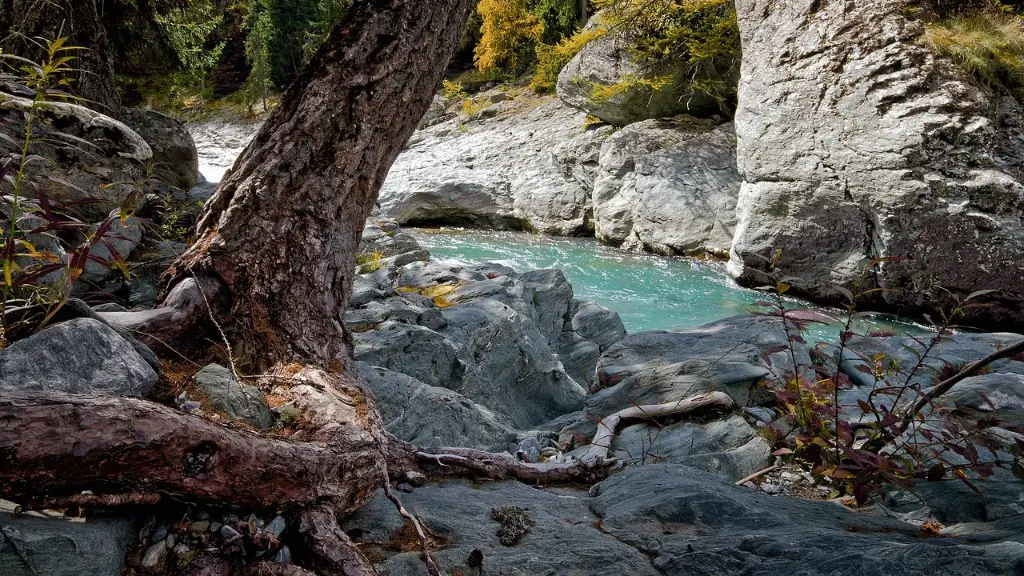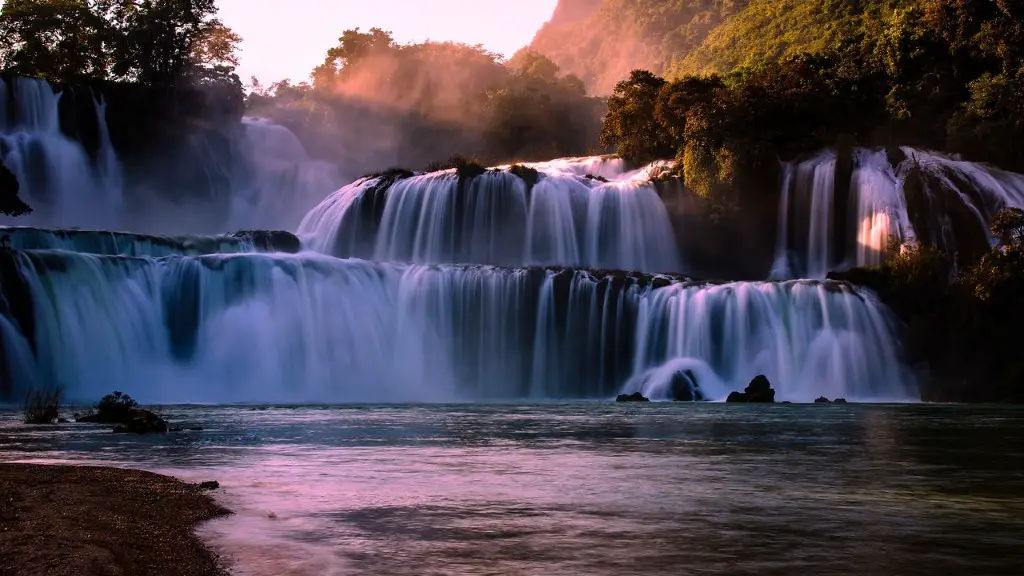Political Impact on Louisiana’s Coastline
The Mississippi River has had a great impact on Louisiana’s coastline, both positive and negative. In terms of politics, the Mississippi River has been a driving force for growth in the area. By providing access to trade routes and the ability to transport goods to foreign markets, the River has played a key role in maintaining the economic vitality of the region.
The political impact of the Mississippi River can be traced back to the Louisiana Purchase in 1803, when the United States purchased a large section of territory from the French government. This agreement allowed the US to claim a large swath of land West of the Mississippi River, and open up greater access to the Gulf Coast trade routes. Additionally, the agreement allowed the US to exercise control over the details of trade along the river, and provided lands for settlement throughout the area.
Thanks to the Mississippi River, Louisiana has been able to benefit from increased trade and transportation. This has led to increased economic activity in the region, as ports along the Gulf Coast and upriver areas have become hubs for import and export activity. The River has also provided a source of revenue from taxation, as well as a source of power for factories and other industrial activities.
As with any major impactful event, the Mississippi River also brought about social and environmental changes to the area. The river’s flooding of certain areas has created settlements on high ground that have served as the source of wealth for many communities in Louisiana. In addition, the River’s disposing of agricultural runoff and waste has had a profound effect on the environment, changing the natural processes that have taken place for centuries.
Environmental Impact on Louisiana’s Coastline
The environmental impact of the Mississippi River on Louisiana’s coastline has been significant. The River’s carving of the landscape has created a variety of ecosystems, while the flooding of certain areas has created wetlands and marshland. This has had an extraordinary impact on the ecology of the area, both in terms of species richness and the diversity of habitats.
The wetlands and marshland created by the Mississippi River serve as a vital buffer against coastal erosion, as well as providing habitats for birds, fish, and other wildlife. Additionally, these ecosystems provide an important source of nourishment for many species of marine and land-based animals, as well as some humans. The natural erosion of sediment caused by the River also helps to replenish the area with valuable remediation material such as soil, minerals and organic matter.
Unfortunately, due to increased pollution from various sources and the destruction of many wetlands and marshlands, the environmental impact of the Mississippi River on Louisiana’s coastline has been damaging in many areas. This pollution has resulted in the degradation of fish and wildlife habitats, as well as an increase in the amount of harmful chemicals entering the ground and surface water. Additionally, the environmental issues caused by sedimentation and erosion have caused significant damage to the local economies as industries struggle to meet the needs of consumers with high quality products.
Economic Impact of Louisiana’s Coastline
The economic impact of the Mississippi River on Louisiana’s coastline is pervasive. The Mississippi River has provided access to global markets, allowed for the transport of goods and people, and created the basis for many industries. As such, the River has become a thriving backbone of the region – providing jobs, resources, and opportunities.
The transportation infrastructure created by the Mississippi River has been a major force in the economic development of the region. With ports and access to global markets, cargo and supplies have been able to move quickly and efficiently. This has led to economic growth, stimulating commerce as well as increasing employment opportunities and resources.
The River has also created an ideal environment for recreational activities, such as fishing, boating, camping, and bird watching. These activities have become a significant source of revenue for hotels, restaurants, and tourist attractions. Additionally, the River has provided a source of transportation for commodities, including agricultural products, and resources – all of which have contributed greatly to the economic gains of the region.
Tourism Impact of Louisiana’s Coastline
The Mississippi River has had an immense impact on the tourism economy of Louisiana’s coastline. The River provides access to the Gulf Coast, allowing visitors to explore the area and experience its unique culture and scenery. Additionally, the River has made it easy for tourists to travel up-river and down-river, where visitors can experience the history, culture, and beauty that Louisiana has to offer.
Thanks to the Mississippi River, visitors are able to explore the many towns and plantations that dot the banks of the grand waterway, discovering the stories of those who lived and worked along its shores. Visitors also have the opportunity to discover the natural beauty of the region, with awe-inspiring landscapes, wildlife, and diverse ecosystems that can only be found near the River.
As tourism to Louisiana’s coastline continues to rise, so does the importance of the Mississippi River in the region. With easy access to destinations and attractions, the River has become an essential part of the experience for travelers, as well as providing an important part of the local economy.
Cultural Impact of Louisiana’s Coastline
The Mississippi River has had a profound impact on the culture of Louisiana’s coastline. The River has been a source of inspiration for music, art, literature, and other forms of creative expression. It has also been a source of spiritual sustenance, inspiring faith-based practices and beliefs that are deeply embedded in the culture of the region.
The River has also played an important role in the survival and prosperity of many communities along its banks. Although communities are often subject to the effects of floods and other environmental catastrophes, the Mississippi River serves as a source of strength, providing food and resources for generations of people who depend upon it.
The culture of Louisiana’s coastline is also heavily influenced by the history of the River. From the Battle of New Orleans to the stories of underground railroad fugitives, to the tales of pirates and escaped slaves, the Mississippi River has served as a backdrop for countless stories of resilience, creativity, and courage. Through these tales, the River has become a touchstone of the region’s history and a foundation for its culture.
Industrial Impact of Louisiana’s Coastline
Since the early days of the nation, the Mississippi River has been an essential part of the industrial infrastructure in Louisiana’s coastline. The River has served as a major highway for transporting goods, materials, and resources up and down the length of the coastline. In particular, the River’s ports have been instrumental for importing and exporting a wide variety of materials and goods, giving the region an important link to global markets.
Furthermore, the River has been instrumental for the construction of levees, dams, and canals that have helped to regulate floods, create navigation routes, and control water levels. All of these changes have been critical for the development of an industrial base in the area, with important industries such as steel, energy, and chemicals depending on the security of the River for their livelihood.
In addition to its importance for infrastructure, the Mississippi River has also been a major contributor to the region’s food security. The River has served as the primary source of drinking water, irrigation, and fishing, while also aiding in the cultivation of numerous crops that feed the local population.
Technical Infrastructure Impact of Louisiana’s Coastline
The Mississippi River has had an enormous influence in the development of the technical infrastructure in Louisiana’s coastline. Most notably, the River has played an important role in the development of a reliable power grid, providing an essential source of hydropower to meet the region’s energy needs.
The River has also made possible the development of communication infrastructure, enabling the technology of television and radio transmission. By controlling the flow of data and electricity, the River has made it possible for the region to enjoy modern technologies such as internet access, cellular communication, and more.
In addition, the Mississippi River has been instrumental for the regional transport of goods and materials. This is mainly due to the numerous locks and dams that have been constructed along the River to regulate traffic and allow for large vessels to pass through. The transportation infrastructure developed by the River has been essential for the efficient distribution of resources, materials, and goods throughout the region.
Social Impact of Louisiana’s Coastline
The Mississippi River has had had a major influence on the social dynamics of the Louisiana’s coastline. The River has brought an influx of people seeking new and better lives, with many immigrants arriving in search of a better opportunity and way of life. Additionally, the River has provided a reliable source of trade and employment, leading to increased population numbers as people were attracted to the area.
The River has also been an important force in preserving the cultural identity of the region, providing a common link between generations of people. As a result, art, music, and storytelling has been deeply intertwined with the river’s history, allowing for the transmission of skills, values, and beliefs from one generation to the next.
The River has also been an integral part of social movements, from civil rights to environmental activists. Throughout its history, the Mississippi River has served as a source of inspiration and power, providing a platform for individuals to organize, demand change, and fight for justice.
The Mississippi River has also had a powerful impact on the psyche of the region. The river serves as an emotional reminder of the challenges many of these communities have faced, but also provides a sense of hope and resilience in the face of adversity. This sense of hope has been instrumental in creating a lasting foundation for future generations.


